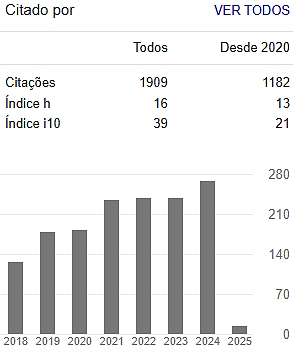THE POWER OF FILM ANALYSIS IN THE EDUCATIONAL CONTEXT: THE EXPERIENCE WITH THE FILM ZERO (2010)
Keywords:
Education; Movie theater; Film Analysis; Aesthetic Education; Short FilmsAbstract
The discussion about the social dynamics that have emerged today, with an emphasis on visibility to the detriment of words, also demands other training and educational perspectives. In view of this, educating the eye, appreciating and analyzing images, especially those coming from audiovisual language, becomes fundamental. This article asks: how to analyze moving images? How do aesthetic devices favor the formation of the spectator? How can cinema contribute to this formative process? Based on Eduardo Galeano's literary invitation, we suggest the film analysis of short films as a powerful methodological way of raising awareness, attention, creation, elaboration, collective production and knowledge. Galeano (2002); Bouilloud (2013); Aubert and Haroche (2013); Fresquet (2020), Vanoye and Goliot-Lété (1994); Elsaesser; Hagener (2019); Adorno and Horkheimer (1985) are some of the authors who supported the debate. The short film Zero (2010), directed by Christopher Kezelos, became a guide for carrying out a formative film analysis due to the fertility and thematic diversity of the animation. We finally consider that understanding the relationship between cinema and education, more specifically, film construction, the behind-the-scenes of film production, its aesthetic devices, its thematic approaches and its axes of interpretation, constitute the essence of film analysis as a possibility of sensitive and aesthetic formation and criticism in the educational context.
Downloads
References
ADORNO, Theodor Wolfgang. Educação e emancipação. Rio de Janeiro: Paz e Terra, 2000.
ADORNO, Theodor Wolfgang; HORKHEIMER, Max. Dialética do esclarecimento: fragmentos filosóficos. Rio de Janeiro: Jorge Zahar Editor, 1985.
AUBERT, Nicole; HAROCHE, Claudine. Ser visível para existir: a injunção da visibilidade. In: AUBERT, Nicole; HAROCHE, Claudine (orgs.). Tiranias da visibilidade: o visível e o invisível nas sociedades contemporâneas. São Paulo: FAP-Unifesp, 2013. p. 13-32.
BOUILLOUD, Jean-Philippe. Do mundo da palavra ao reinado do visível. In: AUBERT, Nicole; HAROCHE, Claudine (orgs.). Tiranias da visibilidade: o visível e o invisível nas sociedades contemporâneas. São Paulo: Editora FAP-Unifesp, 2013. p. 63-84.
BOURTON, Tim. Coraline. [mar. 2024]. Disponível em: https://www.youtube.com/watch?v=tDsgyfS9urw. Acesso em: 23 ago. 2024.
CALVINO, Ítalo. Por que ler os clássicos. São Paulo: Companhia das Letras, 2007.
CÉSPEDES, Fernando. Visão. Podcast ser sonoro: sons, músicas e o mundo da escuta, 14 maio 2021. Disponível em: https://sersonoro.net/2021/05/14/12-visao/. Acesso em: 30 out. 2024.
DEL TORO, Guilhermo. O Labirinto do Fauno. [abr. 2020]. Disponível em: https://www.youtube.com/watch?v=B5sLnQvH0tU. Acesso em: 23 ago. 2024.
ELSAESSER, Thomas; HAGENER, Malte. Teoria do cinema: uma introdução através dos sentidos. Campinas: Papirus, 2019.
FRESQUET, Adriana. Cinema e educação: reflexões e experiências com professores e estudantes de educação básica, dentro e “fora” da escola. Belo Horizonte: Autêntica, 2020.
GALEANO, Eduardo. O livro dos abraços. Porto Alegre: L&PM, 2002.
GINZBURG, Natalia. As pequenas virtudes. São Paulo: Companhia das Letras, 2020.
KEZELOS, Christopher. Zero. [nov. 2013]. Disponível em: https://www.youtube.com/watch?v=bHc7pv3s7NE. Acesso em: 23 ago. 2024.
KEZELOS, Christopher. An Interview with Christopher Kezelos. [Entrevista cedida a] Peter Gallagher à Skwigly Online Animation Magazine, foi publicada em 22 de agosto de 2012. Disponível em: https://www.skwigly.co.uk/an-interview-with-christopher-kezelos/. Acesso em: 23 set. 2021.
KEZELOS, Christopher. Zero - Behind the Scenes. Zelous Criative. [maio 2021]. Disponível em: https://www.youtube.com/watch?v=zhLSZBCn1p4. Acesso em: 23 ago. 2024.
MARTIN, Marcel. A linguagem cinematográfica. São Paulo: Brasiliense, 2013.
MIGLIORIN, Cezar; PIPANO, Isaac. Cinema de brincar. Belo Horizonte: Relicário, 2018.
TARKOVSKI, Andrei. Esculpir o tempo. São Paulo: Martins Fontes, 1998.
VANOYE, Francis; GOLIOT-LÉTÉ, Anne. Ensaio sobre a análise fílmica. Campinas: Papirus, 1994.

